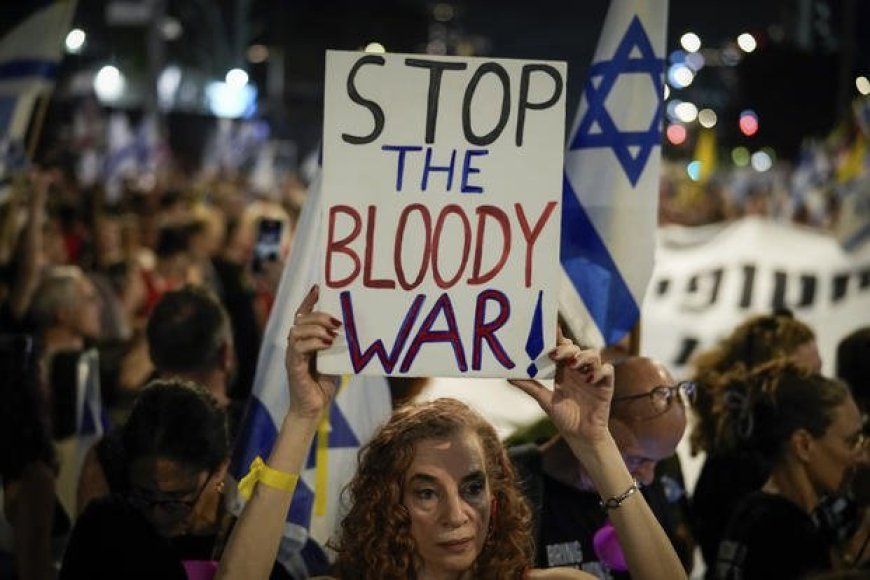Israeli Protesters Block Highways, Call for Cease-Fire to Return Hostages Nine Months into Gaza War
Marking nine months since the war in Gaza began, Israeli protesters took to the streets on Sunday, blocking highways and demanding a cease-fire to secure the return of hostages held by Hamas. Demonstrations erupted in Tel Aviv, Jerusalem, and other cities, with calls for Prime Minister Benjamin Netanyahu to step down and negotiate a truce

Marking nine months since the war in Gaza began, Israeli protesters took to the streets on Sunday, blocking highways and demanding a cease-fire to secure the return of hostages held by Hamas. Demonstrations erupted in Tel Aviv, Jerusalem, and other cities, with calls for Prime Minister Benjamin Netanyahu to step down and negotiate a truce.
The protests coincide with a recent surge in efforts to broker peace, spurred by Hamas’s decision to drop a key demand for an Israeli commitment to end the war. However, the militant group still insists on a permanent cease-fire, while Netanyahu remains steadfast in his commitment to dismantle Hamas’s military capabilities.
"Any deal will allow Israel to return and fight until all the goals of the war are achieved," Netanyahu stated on Sunday, a comment likely to heighten Hamas’s concerns about any proposed cease-fire.
Sunday’s “Day of Disruption” began at 6:29 a.m., marking the exact time Hamas militants launched their initial rocket attack on October 7, 2023. Protesters blocked major roads and demonstrated outside the homes of government ministers. Near the Gaza border, demonstrators released 1,500 black and yellow balloons to symbolize the Israeli citizens who were killed or abducted.
Hannah Golan, one of the protestors, voiced her frustration: "It’s nine months today, to this black day, and still nobody in our government takes responsibility."
Rising Toll and Cease-Fire Efforts
The conflict, which started with a surprise attack by Palestinian militants that killed approximately 1,200 Israelis and led to the abduction of 250, has since claimed over 38,000 Palestinian lives, according to the Gaza Health Ministry. This figure includes both combatants and civilians.
Despite a cease-fire in November that saw the release of over 100 hostages, around 120 remain captive. Israel has concluded that more than 40 of the remaining hostages are dead, raising fears that this number could increase as the conflict continues.
The United States has been pushing for a phased cease-fire in which Hamas would release the remaining captives in exchange for a lasting cease-fire and the withdrawal of Israeli forces from Gaza. Hamas demands guarantees from mediators that the war will end, while Israel seeks the flexibility to resume fighting if negotiations over the remaining hostages falter.
Humanitarian Impact and Military Operations
The prolonged conflict has devastated Gaza, displacing much of its 2.3 million population multiple times and leading to severe humanitarian crises. On Sunday, Israel issued new evacuation orders for parts of Gaza City, already heavily bombed and largely emptied earlier in the war.
In a tragic development, the bodies of three Palestinians, handcuffed and showing signs of beatings, were found near the Kerem Shalom crossing with Israel. The Israeli military stated it was investigating the reports.
Israeli airstrikes continued overnight and into Sunday, killing at least 13 Palestinians, including Ihab al-Ghussein, the undersecretary of labor in the Hamas-run government. A strike on a school-turned-shelter in Gaza City also claimed four lives, including al-Ghussein, whose house had previously been destroyed, killing his wife and daughter.
The Israeli military reported hitting a militant complex and a nearby Hamas weapons facility, emphasizing efforts to minimize civilian casualties. The death toll among Israeli soldiers has reached 680 since the conflict began, with the latest casualty reported in the southern Gaza town of Rafah.
Broader Implications
The ongoing protests and deteriorating humanitarian situation underscore the urgent need for a resolution to the conflict. As international efforts to broker a cease-fire intensify, the pressure mounts on both sides to find a pathway to peace that addresses the humanitarian crisis and the complex political dynamics at play.













































